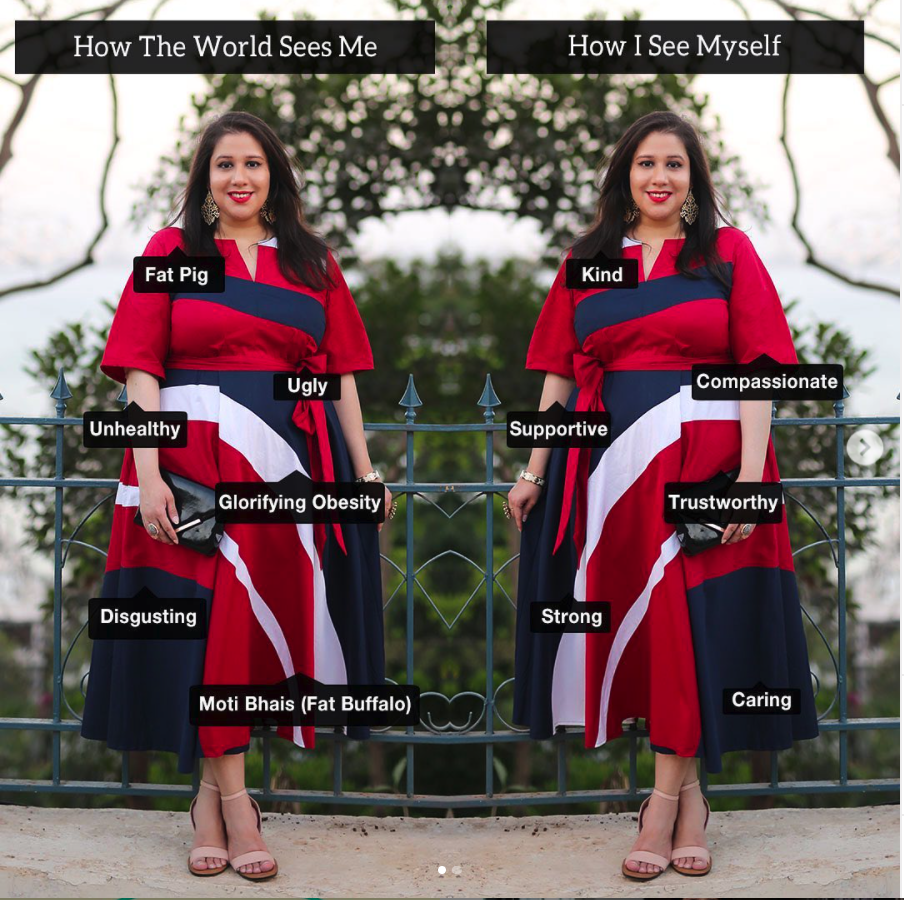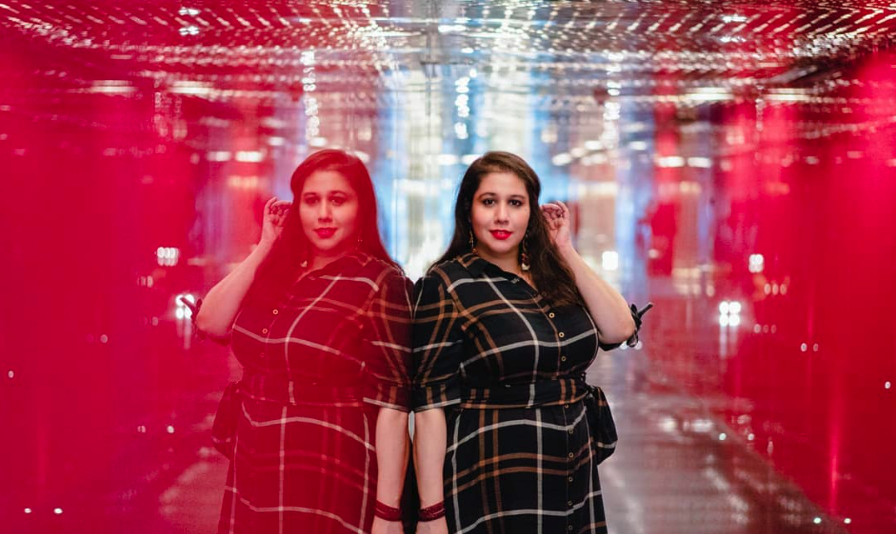Image Courtesy: Amena Aziz @Fashionopolis
As a plus-sized woman in the fashion industry, Amena Azeez knows well how the lack of positive representation of fat people in popular culture has an adverse effect on women and girls who are not thin. A plus size fashion blogger, body positive influencer, and stylist, Azeez talks* to Smashboard's Noopur Tiwari about the fatphobic notion that women have to be smaller than a certain size to find love.
Question- Amena, you’re constantly sending out the important message that a fat person can be active, healthy, happy, as good a lover, partner or parent as any other- how do you have to constantly redefine love given the harmful stereotypes, the fatphobia, and the sizeism that we are steeped in?
Amena: Overall, pop culture, media, and Indian cinema and television for that matter has been very problematic, because they send out a very regressive image of love- and I don’t just talk about the (man)-woman relationship or how they focus around heterosexual love- I also focus in terms of sizing and how it was always the heroine who had to look a certain size in a certain way for her to find love. The whole notion of love has been very skewed, but I think with time you have to change it and the only way you can change it is firstly, you stand up for yourself, you fight against these preconceived notions. And then, you also see visual representation because without visual representation, this won’t change. So for me to actually believe that I will be able to find love, I actually, as a plus-sized woman, as a fat woman, as a full-figured woman, I actually had to see real-life examples of it for me to change my mindset, for me to even be okay with the fact that men would be interested in me beyond my body.
Question- And there are tons of so-called inspiring stories out there where the so-called happy ending comes in a fat person losing weight or thin women learning not to see themselves as fat. Fighting against these deeply internalized and ingrained ideas can't be easy- body love, self love- these are difficult for many, many women no matter what their size. How do you navigate these?
Amena: Growing up, I actually believed I had to lose weight to find someone and I honestly did put out a lot of energy in trying to lose weight. And I think that was the biggest mistake I made, because my goals were, “Okay, I’m losing weight not for myself but because hopefully I can find someone for myself”. And that’s not the right approach at all. Somebody who cannot accept me for the way I look at the start of a relationship is never going to accept me at all. I have come from the fashion industry, so I have seen in close quarters how women would strive to keep shrinking their bodies, keep shrinking themselves, and they would do these unhealthy diets and they would do all kinds of crazy workouts which later on had much negative impact on their bodies, but that time they would not think it through.
I started researching about this whole notion of how one can be comfortable in one's skin and that eventually led me to the body positive movement, and through that I realised that a lot of these notions that we've considered as healthy, as fit- the whole idea that a certain type looks fit- that all completely shattered for me. I figured out that I don't need to constantly count calories or kgs just to be fit. I don't constantly hate my body for the way it is and I have conditioned myself to love it, to respect it, to nurture it, and to accept the fact that this is the only body I am going to ever have, so hating it, or punishing it, or torturing it or letting societies' crass words and mean statements affect it is not helping me. And just for my mental peace as well as for my own health, I stopped letting all of this negativity get to me.

Question- You are also up against a multi-billion dollar fashion industry. Their default ideal size would be somewhere around 10, which is like really, really thin. Anyway, coming to India, we had Bollywood films very cruelly portraying fat women, often played by people like Tun Tun or Manorama, as either not intelligent or outright wicked. How much has any of that changed? We still don't have any icons to look up to, do we?
Amena: Bollywood is not remotely inclusive. Women talk about how much weight they lost. I mean the fact that we see such stories, we have reduced women to their bodies and not talent. Why do we perceive that to break into Bollywood, you have to look a certain way, you have to change your body? We are not even creating a narrative where we can imagine a plus-sized woman as a heroine, where we can imagine a plus-sized woman as the centre of her story, as the lead and not as some side character who is a friend or some cousin. Visual role models play a very important role in how we see ourselves and how we accept ourselves. So in that sense, there are honestly no Indian icons for me to look up to in terms of body positivity, in terms of size acceptance.
Question- We are also talking about love today, but not just romantic love or desirability. There is also love for children, love for the community, love for people around us. As a fat activist, how do you deal with the fact that a lot of the time people, doctors, flight attendants, co-passengers, colleagues, are either indifferent in dangerous ways or they are literally tormenting, bullying fat people? This really puts pressure on fat peoples mental health.
Amena: When you're younger, you internalize it… You cannot stipulate love and you cannot say “I will give you less love or less acceptance based on your size”. I wish our schools would teach this. You know how schools are teaching about good touch and bad touch? It's so important to teach kids about fatphobia, it's important to educate children about bodies because I still see young kids mocking girls who are fat, shaming them for their existence. We have to have a body positive dialogue at the school level, at that basic level so when children are growing up, they grow up free of prejudice rather than grow up with prejudice… These things have to be nipped in the bud at the earliest possible stage and only then will things change and society will change.
*The original interview was a part of the show aired in July, 2019 for the show SmashLive.
Transcription: Akshi Singh
Video Editing & Video Graphics: Apurba Jyoti Borah
Background Art: Lidia Diaz






